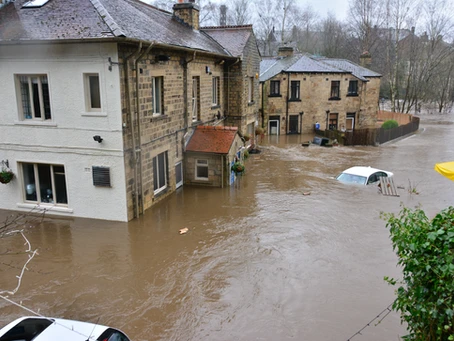Blogs
Your resource for insurance advice, industry updates, and practical tips from the team at Pivotal Insurance Brokers.
It’s no secret that running a business isn’t easy. As a business owner, especially for a startup, you shoulder most responsibilities, such as managing people and ensuring profitability and customer satisfaction. Running a business always comes with risks, such as damaging your store. Luckily, business interruption insurance can help with this. Business interruption insurance is a form of business insurance that covers the income losses of your business. When calamities such as a fire or a flood happen, your company becomes damaged and unable to entertain customers. When this happens, you can make claims to compensate for that time your business was not functional for its usual operations. It’s safe to say that it’s highly beneficial, but many business owners still have reservations because they think it’s just an added business expense. For this reason, we’ll discuss what it covers and why you should get one. More about Business Interruption Insurance Business interruption insurance is a type of property insurance, and it’s usually part of the other property insurance. It covers the business’s costs when it’s unable to generate revenue, whether due to property damage or because the company is closed temporarily due to theft or war. This insurance also covers the sudden closure due to an event or incident beyond the business owner’s control. For example, if there’s a natural disaster, the business will be compensated for its time to shut down. It can also pay for the costs of replacing and repairing the damaged property of your business. What Does Business Interruption Insurance Cover? Business interruption insurance is particularly beneficial for businesses that operate regularly, such as restaurants, hospitals, and retail stores. It becomes necessary to be insured if you need to cover the losses that may happen while your business is rebuilding or repairing. Because of this, it’s also worth knowing what’s covered, and these usually include: Turnover Turnovers are the losses that you’ll incur from interrupting business operations. Whether you have to close your business because of the damage or the sudden closure, you’ll receive compensation for the turnover. Relocation If your business temporarily closes and you decide to move to a different location, the business interruption insurance will pay for the additional costs. It can also help with the additional costs of moving equipment and business records. Record Restoration If your business keeps important financial records, this insurance can help with the costs of restoring your documents in case they get damaged. Whether it was damaged due to a fire or theft, the insurance can help with the costs. Limited Transit Limited transit refers to losses when goods are moved, such as the transportation used to carry your merchandise. It also covers the additional costs of shipping the goods from one location to another. What’s Not Covered? Like any other insurance, business interruption also doesn’t cover certain things. These include: Undocumented Income When the business is closed, it’s hard to provide documentation for lost income. That’s why business interruption insurance won’t cover the income that cannot be proven. Voluntary Closure If you decide to close your business due to normal circumstances, you won’t be able to claim the income you might lose. Furthermore, it won’t cover the closed company because it lacks operation and maintenance. Losses beyond the Indemnity Period The indemnity period is the maximum amount of time that your business is allowed to close due to the damage. If the business is closed beyond this coverage period, you won’t be able to make a claim. Non-Covered Damages Business interruption insurance doesn’t cover damages such as cyber-attacks, which cannot be repaired or replaced. You can buy additional cyber insurance, but it will come with an increased premium. Conclusion It’s always a good idea to have business interruption insurance, especially if your business is dependent on being open daily. Aside from helping you manage the financial losses your business might incur, it also helps protects your business from the financial risk you’re taking. All that matters is that you have the right insurance, and this insurance could mean the difference between a profit and a loss. If you’re looking for business insurance in Gold Coast. QLD, Pivotal Insurance Brokers has what you need! We offer different insurance options to ensure you and your property is protected, all for affordable prices. Simply go to our website to book a free consultation!
The skill of combining parenthood and having your own business is everything but simple. There’s always something vying for your attention: managing client requests and orders, packing the kids’ lunches, maintaining the books, establishing marketing campaigns, mailing parcels, or squeezing in 5 minutes for a lunch break! Whether you manage an internet empire, offer excellent marketing advice, or have the best-smelling candle stall at the local markets, business insurance is something that all enterprises should consider. Without further ado, let’s dive into the popular types of insurance policies available to business owners and how you can get started. Read on! The Types of Business Insurance There are many types of insurance options out there that business owners can get. Insurance helps protect your company from risks that can arise during normal operations. Here are common policies most entrepreneurs get for their business. 1. Commercial Property Insurance Commercial property insurance helps protect your owned or rented building and equipment that you use to run your business. Be aware that this insurance doesn’t cover damage from earthquakes or floods. You’ll likely have to get a separate policy, like commercial flood insurance, to help protect your business from these kinds of claims. 2. General Liability Insurance General liability insurance helps protect your business from the legal costs of being sued if someone is injured on your property, gets sick from something they ate at your food truck, or trips and falls on your sidewalk. You can choose to have this coverage with or without errors and omissions coverage. With errors and omissions coverage, you’re covered if someone claims your business’s work was faulty and contributed to the harm. 3. Business Income Insurance Business income insurance helps you pay for the continued operation of your business if you’re temporarily unable to work because of an illness or injury, or if your business is destroyed by a fire, storm, or some other disaster. 4. Professional Indemnity Insurance Professional indemnity insurance helps reimburse you for the cost of legal advice, if you’re being sued for something that happened when you provided your best professional services. 5. Contents and Stock Insurance Contents and stock insurance helps protect the physical property you have in your office, store, or warehouse, like furniture, computer equipment, and inventory. Contents and stock insurance also covers additional living expenses if you have to live elsewhere while your business is being rebuilt after a disaster. 6. Cyber Liability Insurance Cyber liability insurance helps protect your company from the financial costs if you’re struck by a cyber attack, like a data breach or cyber theft. Cyber liability insurance can cover the cost of hiring a team of cybersecurity experts to help your business recover from the attack, damage to your reputation, and losses from customers or clients who leave. How to Get Started It’s not too late to get started. Here’s the best part – asking for details on if your business is covered for the risks you’re facing is totally doable. To get the ball rolling, we recommend scheduling a call with a local independent insurance agent who can help you compare insurance quotes from several different carriers. They can help you find the right insurance for your business, and it’s usually the first place we go for advice. Here are a few tips to help you get started: Write down a list of all the risks or issues your business might face. Next, write down any assets you have that might be at risk of damage or loss. Take the time to understand the risks and assets, which will help you find the right insurance for your company. Conclusion Finding the right insurance for your business can feel overwhelming, but starting with a list of all your risks and assets can help you get started. Once you’ve taken the time to understand the risks, you can begin your search for the best insurance that fits with your business needs. Find the best insurance policies for your small business assets with the help of Pivotal Insurance Brokers! Our team of Gold Coast insurance specialists does the heavy lifting for you when it comes to finding the right insurance, negotiating on your behalf to find the best value policies. Book a free 15-minute insurance consultation with us now!
We have heard people say that we should invest during a bear market. This stock advice is as sound as the one coming from a stranger. It is prudent to ask for guidance from a stock broker. If this is the case, should we not tap into the expertise of insurance brokers? After all, they have been trained to help us maximise our coverage, but are insurance policies supposed to be one of the safest investment opportunities? If they are a sound investment, why do we need insurance brokers? In this article, we will discover why we still need their help. Assesses Your Risk Exposure If you love to play risky games, you may opt to invest in strategies or products that tend to be more volatile. For example, you may want to invest in a hedge fund. If the fund fails, you may not be able to get the funds back. It is where an insurance broker comes in. They will assess your risk exposure and guide you in purchasing only the right insurance products. They know the products and are familiar with the kind of risks associated with them. They will help you choose the right one, considering your risk appetite. Expertise Insurance brokers are thoroughly trained and well versed with the latest happenings in the insurance industry. They stay abreast with new products and developments in the industry. The insurance products that they offer you have been thoroughly researched. They have done the right amount of homework to make suitable recommendations for you. It is as opposed to general stock brokers with limited insurance knowledge. Subscription to the wrong policy can cause losses, and they will not be held liable. It is why insurance brokers are needed. Kindly remember that they are the insurance experts. Industry Training Insurance brokers know the individual insurance products and know-how to read the fine prints. They are aware of the limitations of the insurance products and can guide you accordingly. It is the only way to maximise the value of your money. The training that they have undergone is extensive and rigorous. Brokers are certified and must attend ongoing training to ensure they are abreast with the latest industry happenings. They are also expected to have deep knowledge and command over the insurance products discussed with them by their clients. Essential When Filing a Claim One of the most common problems with insurance is how difficult it can be to claim. Filing a claim can be time-consuming, but an insurance broker will help you. A well-trained insurance broker will know how to write an insurance claim that will stand the scrutiny of the insurance company and the adjuster. They will approve the claim and ensure the process is as smooth as possible. Insurance brokers will also help you throughout the claims process. They will ensure that you have been handled adequately and get the right kind of help. An insurance broker will ensure that both parties are on the same page and that you get the best possible service. Conclusion An insurance broker is an essential part of your insurance transactions. They will be able to help you make the right decisions on the insurance products that you need. They are the right people to approach when you doubt whether a policy will fit your needs. Now that you know the importance of insurance brokers, you should consult Pivotal Insurance Brokers. We will help you find the right coverage for your needs by assessing your exposure and other factors. Contact us now to get a quote!
The digital world has made it easier to access information with a few clicks. However, this also means that your business information is at a higher risk for cybercrime. It’s impossible for a business to avoid the internet altogether as the internet is now a huge part of our everyday lives. Not using the internet can stunt business growth or even cause business failure. So how can you make sure your business is safe from both hacks and breaches, as well as from information theft? Read on and find out as one of the trusted cyber protection insurance companies shares some tips: Use a Complex Password Your password is the first line of defense against cybercrime. Make sure it is complex, with a combination of both numbers, letters, and symbols. It’s a good idea to change your password every now and then to ensure that it is not easily guessed. You can also make it easier to remember by using a combination of words and numbers to form a password. Use Security Questions No One Else Will Know the Answer To Avoid using security questions that can easily be found online such as your full name, birthday, place of birth, and elementary school. Hackers can easily find answers to your security questions by doing a simple Google search. Instead, makeup questions that only you would know the answers to, and make sure they’re not easy to guess. Use Secure Connections Avoid using a connection that is open and unsecured, such as an unsecured Wi-Fi connection. A secure connection is one that requires you to log in with a username and password. These connections are encrypted and make the data being transmitted more difficult to intercept. Update Antivirus Software and Firewalls Ensure that anti-virus and firewall software are kept updated at all times. Always make sure your firewall has the latest security updates to avoid any weak spots where cybercriminals can break through. Make Sure Scripts and Platforms Are Updated Ensure that your scripts and platforms are updated with the latest security patches. This is important because patches are released to plug security holes found by developers. Be Wary of Scams Be careful of emails from people pretending to be someone you know. Don’t click on unfamiliar links. Be wary of any email you receive from someone you don’t know personally. These emails could be a scam that is designed to trick you into giving them your personal information. Keep Back-Up Plan Ready If your business’ data is stolen or hacked, it’s important to have a backup plan ready in case you need to recover your information. It’s best to have your data backed up in a safe location, and you can also consider storing it off-site as an extra precaution. Stay Updated Stay up-to-date with the latest news regarding cybercrime. Also, ensure that your employees are trained on the latest threats and how to protect themselves and the business from cybercrime. Make Sure You’re Insured Insurance is important as it can help protect your business and your customers in case there is a breach or cybercrime. Make sure that you and your business are insured against cybercrime. You can do this by purchasing an IT policy from your insurer. Conclusion It’s crucial for businesses to protect themselves from cybercrime or a cyber attack, as cybercrime can cause serious damage to a business. In fact, cybercrime costs businesses billions of dollars every year. Businesses looking to protect themselves online should make sure they have a range of different security measures in place, including getting cyber protection insurance. This is to ensure that they can prevent cybercrime as much as possible, as well as make it easier to patch things up if they are breached. Pivotal Insurance Brokers offers cyber protection insurance on the Gold Coast to ensure that your business is safe from breaches and cybercrimes. Get in touch with us to know more about cyber protection insurance!
If your small business relies on digital technology to make sales, communicate, or keep data, you are subject to “cyber liability” or “cyber risk.” As strange as it may sound, cyber risk will be a genuine threat in 2022, costing the global economy more than $450 billion each year. These expenses might result from various circumstances, such as having your website hacked or being sued for anything you published online. Fortunately, cyber insurance may help. What is Cyber Liability Insurance? Cyber liability insurance is a form of property insurance that will cover financial losses, and sometimes physical damage, resulting from a cyber attack. As technology becomes more ubiquitous, cyber liability is becoming a major issue. Because small businesses tend to focus more on their core competencies than on technology, they are often targets of cybercriminals, who may target them to gain access to many customers or client data. What Does Cyber Liability Insurance Cover? Cyber liability insurance aims to protect your business and its finances and prevent major losses. These policies usually provide coverage against the following: Data Breach This coverage will pay for the expenses related to the theft of private data. This includes costs related to legal representation, damage to your reputation and lost profits. Unauthorised Access This coverage pays for expenses related to unauthorised access to your computer system. This includes the cost of hiring a lawyer and any penalties imposed on your company. Physical Damage This coverage reimburses your company if there is physical damage to your computer hardware or software due to a cyber-attack. Theft This coverage will pay for the theft of your computer system and its accessories, as long as you can prove that the theft was related to cybercrime. Legal Defense Costs This coverage will pay for your legal defence costs if you are charged with cybercrime. Does My Business Need Cyber Insurance? The answer to this question depends on your business’ needs. As a general rule, small businesses (under $10 million in revenue) have less exposure to cybercrime and do not need to obtain cyber liability insurance. However, there are several reasons why it could be beneficial for your business to obtain a policy. If you: Generate a large amount of revenue from e-commerce. Store sensitive client information. Pay for your employees’ personal devices to access your network. Have a high turnover rate for your IT staff. The Cost of Cyber Liability Insurance Vs. The Cost of Cyber Crime According to the Australian Government’s Stay Smart Online campaign, cybercrime costs businesses roughly $276,323, with detection and recovery accounting for 53% of the cost. This is why cyber liability insurance is a good idea. The expenses of obtaining coverage can vary depending on your unique organisation, but as a general rule of thumb, a policy can cost roughly $3,000 for a company with a $5.5 million annual revenue. Conclusion The reality is that cyber-attacks are on the rise, and the sooner you can get your business covered against such attacks, the better. Cyber liability insurance, when coupled with a sound IT strategy, will allow you to remain profitable even if your small business falls victim to a cyber attack. If you want to protect your business assets, Pivotal Insurance Brokers has you covered. We provide cyber protection insurance on the Gold Coast to help you out. Get the protection you need by contacting us today.
Do you know how much it will cost to replace your home and possessions should something happen? This is the reason a home and contents insurance exists because this will help compensate for financial loss. With this type of insurance, you get to protect yourself from financial risk should your home get damaged or destroyed and cover your home’s contents if they are damaged. Home and contents insurance covers two things: Home Insurance Home insurance is designed to protect you from the financial consequences of damage or destruction of your home. It can also cover other people injured on the premises when an accident occurs. It also provides cover for the loss of your possessions. This includes personal belongings like clothes, furniture, appliances, and tools. Damage or loss caused by water and mould are also covered. Contents Insurance The contents portion of your insurance will cover the replacement cost of your home’s contents if these are damaged or destroyed. This includes things like clothes, furniture, appliances, and tools. The Home and Contents Insurance Coverage Different insurance providers have different levels of coverage in their policies. You can’t assume that your policy covers everything you own. Here are the different levels of coverage you’ll encounter as you research. Standard Contents Most insurance policies protect your possessions against defined events, like storms, fires, or burglaries. If any of these occur, your coverage will reimburse you for the cost of the lost items. Specified Items Specified items coverage will replace covered items up to certain monetary limits. For example, you could add coverage for jewellery or a special family heirloom. You may want to look into this type of coverage for high-value items. Accidental Damage Accidental damage coverage will protect your possessions against damage caused by fire, smoke, lightning, explosions, falling objects, and riots. Flood Insurance Flood insurance is available to homeowners living in flood-prone areas. It will cover damage from flooding and provide coverage for some structural damage. Portable Contents Homeowners can increase the value and limit their out-of-pocket costs with portable contents coverage. It will protect you against damage to your electronic equipment, jewellery, firearms, and other valuable items. Is a Home and Contents Insurance Right for You? To determine whether you need a home and contents policy, you need to consider the items you own and how much it would cost to replace them in the event of a major loss. You also want to look at how much money you would need to rebuild your home in a disaster. Also, you may want to look at your current assets, what you owe on your home, and how much you stand to lose if that investment is destroyed. The most important thing to do is evaluate your financial risk regarding your home and the possessions you value most. After that, you can decide whether you want to look into purchasing a home and contents insurance policy. The Bottom Line When it comes to your home, there are a lot of things you need to consider in terms of property damage and your possessions. You don’t want to leave anything to chance, and you want to be confident that you are protected if you come up against a crisis. For this reason, a home and contents insurance policy can be an excellent idea. Are you thinking of getting home and contents insurance? Pivotal Insurance Brokers has a team of the best insurance brokers to help you out. Get in touch with us.






